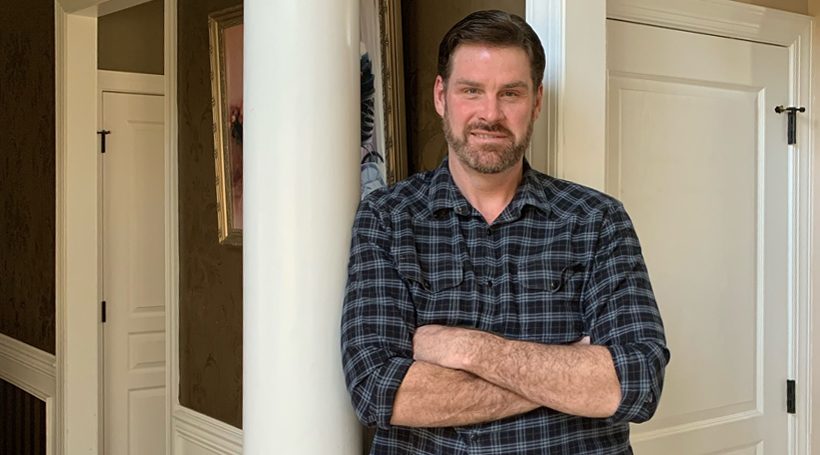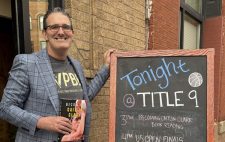A blood alcohol level above 0.40 percent puts you at risk of coma or death – your heart or breathing can stop at any moment. In 2006, when former Flyers star Chris Therien walked into a central Pennsylvania rehab facility, a couple hours northwest of his home in Marlton, his level was almost double that number.
“My blood alcohol level was 0.63,” Therien says. “That’s like a world record. They even said nobody’s ever come in here with this number and lived.”
Today, those days are a distant memory for the 49-year-old. In February, he got more than 13,000 likes with a tweet celebrating 10 years without a drink. Now his route to happiness is not through a bottle but from helping others kick addiction. He is part owner of Limitless Recovery Center in Philadelphia and has focused the personality that made him a hit in the locker room – and on the air as a Flyers broadcaster until being let go last year – into making the facility a success. His addiction used to be his family’s most closely held secret. Now he’ll talk about it to anyone, because his mission is to help others find the path to recovery. “To be able to do what I do at Limitless Recovery Center, I had to share my story,” he says.
“To be able to interact with people, I would have to open up and let them know my own struggles.”
Therien never had an interest in narcotics. His drug of choice was alcohol. If there was an 11:30 am practice, he’d put in the work and when it was over, head out for a ‘liquid lunch.’”
Therien, nicknamed “Bundy” by his teammates, was able to balance it all for years. He joined the team in 1994, retiring in 2006 as the longest tenured defenseman in Flyers’ history. Scoring was never his thing, but at 6-foot-5, 230 pounds, he was able to successfully muscle opposing players out of harm’s way. Among his skills was his ability to drink without appearing drunk. Prodded if he ever played a game drunk, he replies, “Probably.”
The 2004-05 lockout, which resulted in the cancellation of the National Hockey League season, sent him into a dark place. He couldn’t play, and with too much time on his hands, he started to fall victim to his demons. Then, in the final season of his career, his world fell apart.
In January 2006, he suffered a severe concussion that led him to retreat into himself and push friends and teammates away. His play deteriorated to where he realized he did not belong on the ice and sank into depression. He fought more with his wife Diana. His young children internalized the stress.
“There were times when I would find myself having to go through my dad’s closet to try to find bottles of alcohol, because I knew drinking wasn’t ok and it wasn’t healthy,” says Isabella, 22, Therien’s oldest child, who played basketball at Loyola University Maryland last season alongside her sister Ava, 20. “I think I had a pretty good understanding of how bad it really was. A glass of wine, from what I saw, would maybe turn into a bottle of wine. You just learn to sit back and watch what’s going on around you. It was really scary.”
The father of 4 realized he couldn’t continue this way.
“I kind of knew it was like the end of a road for me,” Therien says. “I felt like I wasn’t the same player. I felt like I wasn’t even the same person. At the end of the season, on June 1, I called the NHL’s behavioral health team and said I’ve got a problem.”
“I decided, ‘All right, I’m going to be a great dad, a better person, a better husband, a better friend, a better son, and make my sister proud of me.’”
A league doctor set him up to go to detox, so he could focus on getting sober.
But on June 11, he received a call that his 32-year-old sister, Sarah Beth, had collapsed back home. It turned out she’d been living with an undiagnosed heart ailment. She died 6 days later.
“It was the worst month of my life,” Therien says. “She was like one of the great loves of my life. She was my sister and my best friend. It broke my heart.”
Two weeks after the funeral, he entered rehab. Having hit rock bottom, Therien was ready to climb his way out. He found the strength to get sober and soon was hired to the Flyers’ broadcast team. He stayed sober for 2 years, but he found his mind engaged in an ongoing battle – “like a little devil and angel,” he says. He relapsed, although never as deeply as in 2006.
Finally, he made the decision that changed him forever. He wouldn’t touch alcohol ever again. Since February 7, 2011, he hasn’t.
“I said, ‘That’s it. You’re going to do this, you’re going to stay focused,’” Therien says. “I went to 120 [rehab] meetings and committed myself to the program. Isabella was 12, and the other kids were still very, very young. I decided, ‘All right, I’m going to be a great dad, a better person, a better husband, a better friend, a better son, and make my sister proud of me.’”
Therien was let go by NBC Sports Philadelphia after last season as part of a cost-cutting move, ending a 14-year run. However, he says, he harbors no bitterness. Losing his on-air role allowed him to go all in on a plan that had been in motion for 3 years – operating a rehab facility.
When he met Dominick Schiavone, 30, of Haddon Heights, who had quit heroin and been in the recovery business since age 22, he knew he met someone to take the journey as one of the co-owners of Limitless Recovery Center, which can accommodate 30 patients.
Then came the tweet marking his 10-year anniversary without a drink. The attention has come in waves ever since, including from former teammate Jeremy Roenick, who tweeted, “Way to go, Bundy! Amazing accomplishment that is life changing!” Two former NHLers called in tears at seeing him go public, because they were still suffering privately from alcohol addiction.
While many find shame in their addiction, Therien has leaned into his oversized personality as he goes public with his story. He even has his family members helping spread the message.
“When my dad came out with this new passion project, all my emotions resurfaced,” Isabella says. “I came to realize that what happened in my childhood, what happened with my dad, is not something to be ashamed or embarrassed about.” Telling the story, Therien says, is the gateway to helping others get their lives back. “It’s impossible for you to say you can’t do it,” he tells others trying to fight off alcohol addiction, “because I did.”














